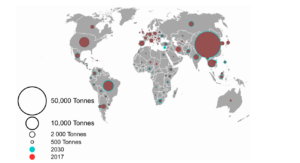Antimicrobial resistance and Covid-19 are dual threat to humans. Social distancing, using masks and frequent hand hygiene is the key to prevent covid-19 infection. A sudden increase in usage of hand sanitiser and other non-pharmaceutical approaches is observed during the current pandemic situation. Do these practices have any role in development of antimicrobial resistance? The research article by Tekle Airgecho Lobie et al dwells right into this question.
The frequent use of hand sanitisers and disinfectants in various concentrations and doses has led to the emergence of bacterial pathogens that are tolerant to the antimicrobial components in those solutions. For example, BenzAlkonium Chloride (BAC) comprise broad spectrum of antimicrobial agents that target bacteria, fungi, and viruses. They create a selective environment favouring some microbes thereby conferring cross-resistance to various antimicrobial agents. Similarly, microbes mutate to their resistant forms on continuous exposure to phenol or hydrogen peroxide, two common constituents in sanitising solutions. Coupled by the injudicious use of antibiotics in Covid19 treatment, the situation is worrisome.
Additionally, the pandemic has possessed health system challenges, especially in the preventive and control programs of other infectious diseases of public health priority like tuberculosis, malaria etc, by compromising the accessibility to the healthcare centres
To learn more, kindly visit the website of the International Journal of Infectious Diseases (Link).







